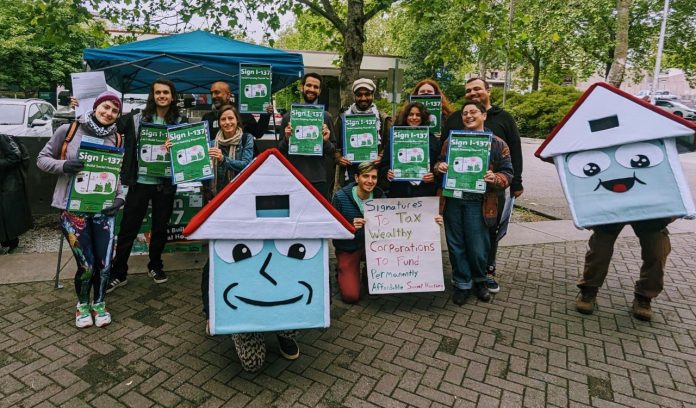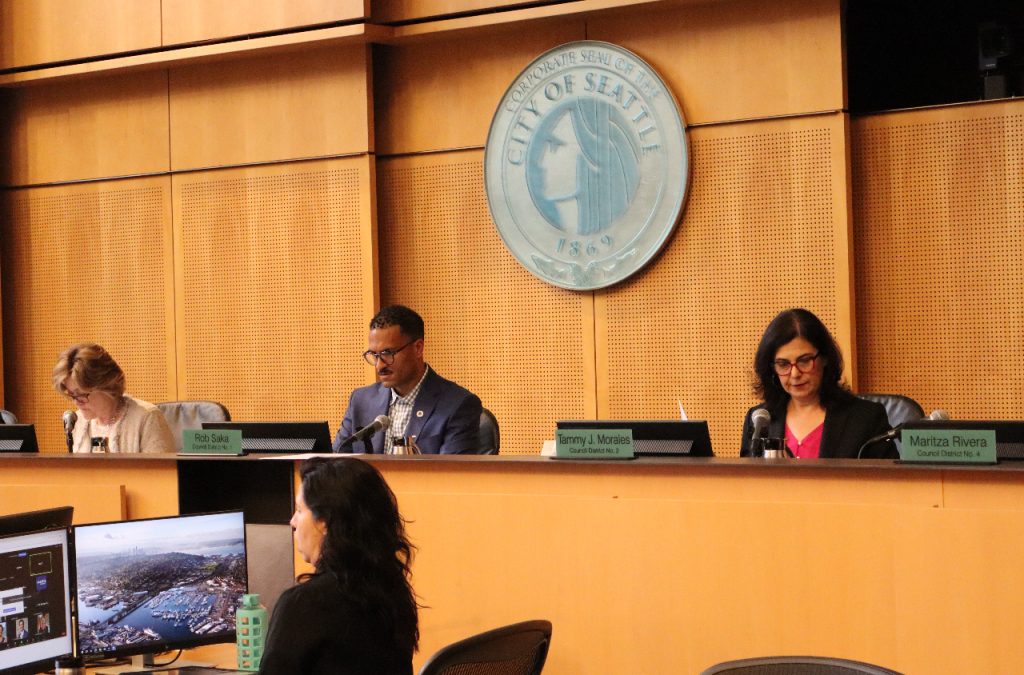
Seattle voters will not see Initiative 137, which seeks to create a funding source for the city’s newly created social housing developer, on their ballot this November after the Seattle City Council delayed a vote on the issue Tuesday. Despite signature-gatherers clearing the bar and submitting well over the required 26,520 signatures needed to put an initiative on the ballot, the delay means that the measure won’t go before voters until a February special election, bypassing the high-turnout Presidential election. Even a delay of just one day after Tuesday would have meant the city will miss the deadline to get the ballot language to King County Elections in time for November.
Initiative 137 would impose a new high earners tax of 5% on annual individual employee compensation above the $1,000,000 threshold. It’s a follow-up to 2023’s I-135, which created the public developer with the explicit purpose of coordinating to create mixed-income social housing in Seattle, distinctive from the city’s existing affordable housing programs by relying on market-rate units to subsidize some of the costs for lower-income tenants. Under a draft business plan created by House Our Neighbors, the nonprofit group behind both initiatives, after 10 years, the developer would have produced 2,000 housing units, the majority of which would be existing units that get acquired along with just over 600 newly built units.
Business groups, including the Seattle Metropolitan Chamber of Commerce, are asking the Seattle Council to add a countermeasure next to I-137 on the ballot, but Seattle Council staff have not yet had enough time to develop such a proposal. Last week, Councilmember Cathy Moore said she was interested in such a proposal, suggesting that the city should instead increase the size of the existing Seattle Housing Levy, which voters approved just last year. Over the past month, Seattle residents have been getting polled on a housing levy supplement proposal that would increase the cost to property owners by another 10 cents for every $100,000 in assessed value, an increase of just over 20%.
In making the motion to remove the resolution addressing the initiative from the agenda, Councilmember Bob Kettle cited potential legal issues that the Council needed to resolve before it voted. “Legal issues have been raised, but not addressed in our standard council briefing executive session, as is with our protocols,” Kettle said. “Good governance requires us to do our due diligence on these legal questions, and is the basis of my motion.”
No other councilmembers spoke in favor of removing the item from the agenda.
Councilmember Tammy Morales, who cast the only vote against the motion, cited the city charter itself in arguing that the body had an obligation to vote Tuesday. The charter’s language states that “[c]onsideration of such initiative petition shall take precedence over all other business before the City Council,” yet it is not clear exactly when the item will return to the council’s agenda as it heads toward its regularly scheduled recess at the end of August.
“We should not be doing any other business until we weigh in on this initiative,” Morales said. “And if we do delay this vote, and are found to be in violation of the City Charter, we open ourselves up to legal liability including potential recall.”
Nonetheless, all other Councilmembers voted in favor of the motion, with the exception of Councilmember Moore who abstained.

Beyond a desire to ask more questions about the initiative in executive session behind closed doors, there are other reasons that the Council might have wanted to punt the issue to February that were lurking below the surface. November’s ballot includes a $1.55 billion transportation levy that the Council approved last month, and having a separate tax increase measure on the ballot below it likely makes some councilmembers anxious.
Then, just this week, Seattle’s independent Office of Economic and Revenue forecasts released its latest city revenue forecast, offering very little good news when it comes to the city’s looming general fund deficit, pegged at more than $250 million next year and even more in 2026. The only glimmer of hope in the forecast was the JumpStart tax, which is expected to bring in more revenue than expected as local tech companies buck regional employment trends, according to city projections. But Jan Duras, the interim director of the forecast office, cited I-137 as one potential source of risk of job creation that would be causing JumpStart revenues to increase.
“Office vacancy rates are likely to increase in the future, which means that for any employer deciding where exactly to create jobs, there are going to be a lot of options available, and these employers are likely to take all the incentives, all the impacts of current policies if their intent is to create jobs, into account,” Duras said. He said that unlike the sales tax and business and occupation tax, the high earner’s tax doesn’t have a cap and employers might be inclined to expect that it will increase.
But many of those same concerns were raised during the debate around the JumpStart tax itself, approved in 2020. The Chamber staunchly opposed JumpStart, with many of their claims echoing now over I-137.
A February ballot doesn’t necessarily spell doom for I-137, with the initial 2023 social housing initiative passing during a February special election by 15 points with only one third of Seattle’s registered voters tuning in ballots. And it’s far from clear why the Chamber of Commerce thinks that a broad property tax increase would be more palatable to voters than a targeted higher-income payroll tax. Earlier this year, the Chamber opposed an amendment increasing the transportation levy by another $18 million yearly by arguing about its potential tax burden.
While the Seattle City Council as a whole doesn’t seem to have a competing vision for affordable housing in Seattle, rejecting a program proposed by Morales earlier this year that would have offered zoning incentives for equitable development, that didn’t seem to stop them from impeding a citizen’s initiative that had clearly met the required threshold.
Ryan Packer has been writing for The Urbanist since 2015, and currently reports full-time as Contributing Editor. Their beats are transportation, land use, public space, traffic safety, and obscure community meetings. Packer has also reported for other regional outlets including BikePortland, Seattle Met, and PubliCola. They live in the Capitol Hill neighborhood of Seattle.

